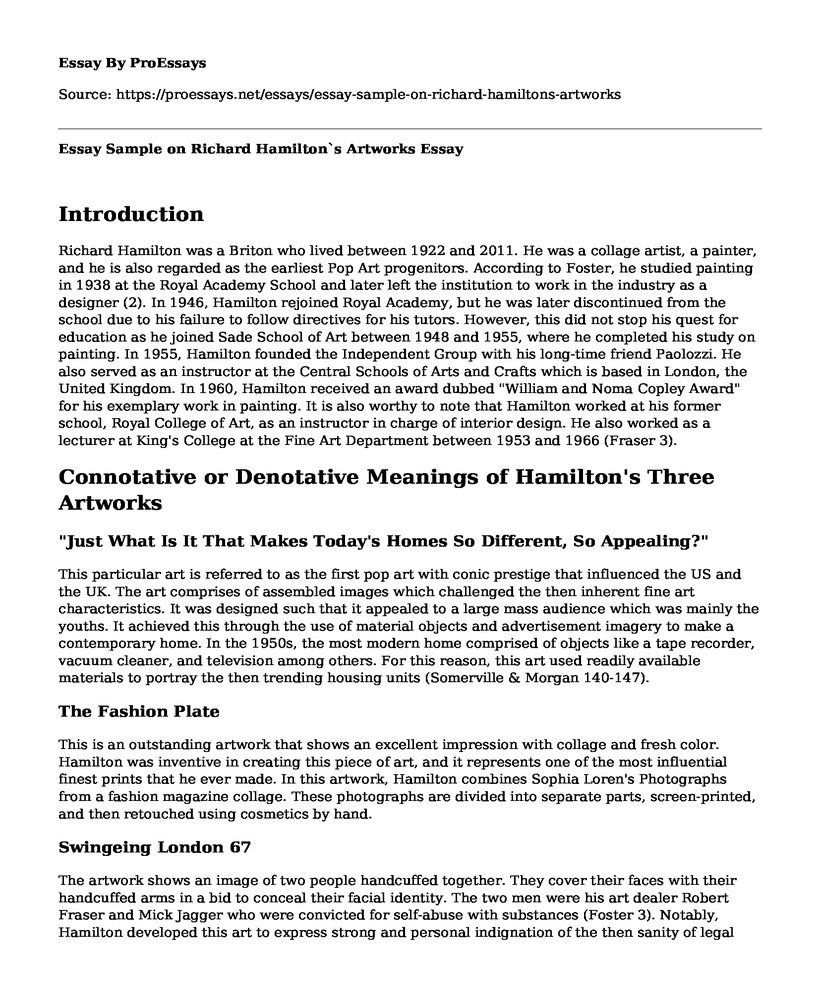Introduction
Richard Hamilton was a Briton who lived between 1922 and 2011. He was a collage artist, a painter, and he is also regarded as the earliest Pop Art progenitors. According to Foster, he studied painting in 1938 at the Royal Academy School and later left the institution to work in the industry as a designer (2). In 1946, Hamilton rejoined Royal Academy, but he was later discontinued from the school due to his failure to follow directives for his tutors. However, this did not stop his quest for education as he joined Sade School of Art between 1948 and 1955, where he completed his study on painting. In 1955, Hamilton founded the Independent Group with his long-time friend Paolozzi. He also served as an instructor at the Central Schools of Arts and Crafts which is based in London, the United Kingdom. In 1960, Hamilton received an award dubbed "William and Noma Copley Award" for his exemplary work in painting. It is also worthy to note that Hamilton worked at his former school, Royal College of Art, as an instructor in charge of interior design. He also worked as a lecturer at King's College at the Fine Art Department between 1953 and 1966 (Fraser 3).
Connotative or Denotative Meanings of Hamilton's Three Artworks
"Just What Is It That Makes Today's Homes So Different, So Appealing?"
This particular art is referred to as the first pop art with conic prestige that influenced the US and the UK. The art comprises of assembled images which challenged the then inherent fine art characteristics. It was designed such that it appealed to a large mass audience which was mainly the youths. It achieved this through the use of material objects and advertisement imagery to make a contemporary home. In the 1950s, the most modern home comprised of objects like a tape recorder, vacuum cleaner, and television among others. For this reason, this art used readily available materials to portray the then trending housing units (Somerville & Morgan 140-147).
The Fashion Plate
This is an outstanding artwork that shows an excellent impression with collage and fresh color. Hamilton was inventive in creating this piece of art, and it represents one of the most influential finest prints that he ever made. In this artwork, Hamilton combines Sophia Loren's Photographs from a fashion magazine collage. These photographs are divided into separate parts, screen-printed, and then retouched using cosmetics by hand.
Swingeing London 67
The artwork shows an image of two people handcuffed together. They cover their faces with their handcuffed arms in a bid to conceal their facial identity. The two men were his art dealer Robert Fraser and Mick Jagger who were convicted for self-abuse with substances (Foster 3). Notably, Hamilton developed this art to express strong and personal indignation of the then sanity of legal institutions in the UK which jailed people for a self-drug abuse offense.
Interpretations of Three Artworks from Critics, Historians, or the Artist
"Just What Is It That Makes Today's Homes So Different, So Appealing?"
Historian John-Paul Stonard elucidated that this piece of art consisted of images obtained from America's the Tomorrow's Man Magazine. On the other hand, staircases in this art were taken from Constellation, Hoover's new model advert. Nevertheless, represent the modern fashion in the contemporary floors. The artwork has received criticism, especially from John McHale. He criticized Hamilton, saying that this artwork was his brainchild. Before he died, he claimed that he had given Hamilton the original measurements and design for the collage as well as the materials to be used in building it. This included magazines that were sued to assemble much of the artwork. He asserts that Hamilton's role was simply to put together the collage through cutting and pasting. Nevertheless, despite the criticism from McHale, the artwork remains a masterpiece in the Pop Art.
The Fashion Plate
This piece of art is unique since it gives a sense of ideal beauty. Its form consists of constructed fragment parts that paradoxically appear both as fragmented and as a whole. This art fundamentally diffuse half-tone compositions and creates a collage that when viewed appear as a whole. It supports the idea that the perception of a person's experience is regarded as a fusion of fragmentary and abstracted reality. Therefore, Hamilton embraced the popular culture aesthetics while still maintaining the role of fine arts. He developed this art as a demonstration of his belief that fashion entails giving something a form.
Swingeing London 67
Historians assert that this artwork was obtained from a newspaper. Imperatively, the newspaper had photographed Mr. Mick Jagger, and Mr. Robert Fraser handcuffed together after they appeared before a court to answer drug-related charges. Also, the title of the artwork was coined from the newspaper's wordings that pinpointed that the judge who convicted Fraser and his friend insisted on imposing a swingeing penalty (Somerville & Morgan 140-147). Noteworthy, this artwork epitomized the moral backlash that was evident against liberalization in the 1960s.
Works Cited
Foster, Hal. The first Pop age: Painting and subjectivity in the art of Hamilton, Lichtenstein, Warhol, Richter, and Ruscha. Princeton University Press, 2014.
Somerville, Kristine, and Speer Morgan. "Pop Modern: Richard Hamilton's Ulysses Illustrations." The Missouri Review37.2 (2014): 140-147.
Cite this page
Essay Sample on Richard Hamilton`s Artworks. (2022, Oct 28). Retrieved from https://proessays.net/essays/essay-sample-on-richard-hamiltons-artworks
If you are the original author of this essay and no longer wish to have it published on the ProEssays website, please click below to request its removal:
- The Women's Crusade - Rhetorical Text Analysis Sample
- Rabbit-Proof Fence by Doris Pilkington Essay
- Assignmet Example on Social Media
- Fake News in Facebook and How to Solve It
- Essay Example on Sports Marketing in the Digital Era: A Study of Changes and Outcomes
- Movie Analysis Essay on The Life Equation
- Character Traits and Thematic Representations in a Play - Essay Sample







